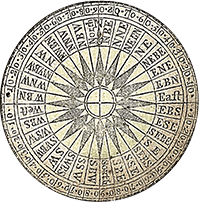Thomas Wildcat Alford, or Gay-nwaw-piah-si-ka, (1860-1938) was the great-grandson of Tecumseh and a member of the Shawnee tribe. He attended the Hampton Institute in Virginia and converted to Christianity. Because of his conversion, he was rejected by the Shawnee and was not permitted to become chief.


It is not surprising that he was rejected for renouncing an essential element of Shawnee culture. In 1822, John Johnston, a federal Indian Agent who worked with with the Shawnee for decades, wrote the following concerning the Shawnee religion:
“The Shawanoese believe that Religion is a very good thing and keeps them at peace with other, as well as peace in their own minds. All those who respect religion prosper and are forever happy; (they) believe that their religion came down from heaven;
There are two roads; the virtuous and good after death go to a place of happiness, where they shall want nothing that the can desire, and the bad will go to the torment and endless misery –and that their conduct in this life will be decisive of their state in the world to come… that there is one great and supreme God, the maker of all things, the master of life” they call him We-she-Manitou. From Weshe, something that is supremely beautiful, excellent, or desirable, and Manitou, God.
(They) have the strongest confidence in their maker, believe that he constantly governs the world and all things in it, that they could not exist a moment without his power and goodness. They are in constant practice of praying for favours and assistance in making sacrifices and oblations to procure divine aid: but have no idea of a general judgment.
The pleasure they anticipate in a future state of existence is more corporeal than mental. They believe their religion to be of divine appointment, and suited to their condition, are opposed to receiving Christian instruction.”
This information was found in the Scrapbook of Leonard Hill and contained a Shawnee rendition of The Lord’s Prayer in the same article.
Our Father, which art in heaven,
Ne-la-wa No-the-na, La-gwa Spi-me-ke-A-pe-ta,
Hallowed be thy name.
Ne-tagh-quele-mabe-kit-e-she-tho.
Thy kingdom come,
Ke-la-no-sa-ta-ma-wegh-he-a-wa,
Thy will be done, On Earth as it is in Heaven.
Ke-la-we-a-mitch-to-ta, O-ta-she-na-tha-pe-ta-hap-pe-an-e-Spime-ke.
Give us this day, our daily bread and for give us our debts,
Me-le-to Ve-la-wa Ye-a-ma, Ne-la-wa Thwawa-puck-a Tuckgwan-a, Wi-ne-cat-a-loo Ne-la-wa O-sen-a-a-ga,
As we forgive, our debtors.
Sha-ke-ne-la-wa-now-en-e-can-ta, Ne-la-w ma-she-ne-getche.
And lead us not into temptation, but deliver us from evil.
Neke-she-washe-Ta-ke-ta-mut-cha-se-ke, Pie que- negh-wa-ben-shepa Ta-mut-cha-se.
For thine is the kingdom, and the power, and the glory forever.
Ke-la-we-se-ta-hap-pe-na-ne, Ke la-we-she-cat-e-wan, Sheka-nan-es-can-kim-she-ke-la-wa La-gwa-te-she.
Amen
E ne-weha-ke
The Shawnee Alphabet by Thomas Wildcat Alford
This instruction written by Thomas Alford concerning the Shawnee language was found in the Journal of George Johnston. I do not believe it was original to the Journal. It appears the journal was added to by someone collecting or cataloging information about the Shawnee Tribe.
The Vowels
The vowels only has each two length of the same sound which are a, e, i, o, r, u and v; and are divided into long and short vowels, representing the long and short length of the same sound. The long vowels are a, e, o and r; and the short are a, i, u and v. The letter a is the only one found in both long and short vowels.
The Sounds of Letters
A is sounded as a in English word hay or bay.
B is sounded the same as in English, and is always followed by long vowels, thus: ba, be, bo, br and in diphthongs as bho, bhr, bia, bir, bur, bwa, bwe, bwr and so forth.
C is sounded as chi in English word chin and is always followed by short vowels.
D is sounded same as in English, and is always followed by long vowels in every respect as that of letter B.
E is sounded as ee in English word bee or deed.
F is sounded as th in English word the or thee. (The Shawnee language has no sound as that represented by F in the English.)
G is sounded as g in English word give (always hard), and is followed by all vowels, excepting u and v.
H is sounded the same as in English, but is often silent representing a short silence of a mere aspirate pause when followed by a consonant which seem to cut short the vowel that precedes it. This is important. For instance, take the Shawnee word maci which means many; and put letter h between the vowel a and the consonant c, dividing the two syllables by this short pause, you have mahci which means have been.
I is sounded as i in English word chin or pin; and is used in place of y with short vowels,thus: ia, iu, iv and with diphthongs iah, iuh, ivh and so forth.
J is sounded as j in English word just or justice; and is always followed by long vowels, thus: ja, je, jo, jr and in every respect as that of letters B and D.
K is sounded as k in English word kind; and is always followed by the short vowels i, u and v. The syllable ki in most Shawnee words occurring at the end of a word is a sign of a plural as s in English.
L, M and N are sounded same as in English.
O is sounded as o in English word mole or note.
P is sounded same as in English, and is always followed by short vowels, thus: pa, pi,pu, pv; and pwa, pwi, pwv and so forth.
Q is sounded as qu in English word quick or quake.
R is sounded as aw in English word law or paw.
S is sounded same as in English.
T is sounded same as in English, and is always followed by short vowels in every respect as that of P.
U is sounded as oo in English word book or took.
V is sounded as u in English word tuck or luck.
W and X are sounded same as in English.
Y is sounded same as in English, and is always followed by long vowels in every respect as that of B, D and J.
Welcome to “Sharing the Stories of History with Tim Mann”!
Meet Timothy A. Mann, a passionate historian born and raised in the heart of Shelby County, Ohio where Tim’s roots run deep in the rich soil of American history. As the author of articles and books, including “Frontier Miscellany Concerning the Miami County Ohio Militia,” “Colonel John Mann, His Kith and Kin,” and “Frontier Militia – The War of 1812,” Tim’s literary contributions have enlightened and inspired countless history enthusiasts.
Join Tim Mann on a journey through time as he shares fascinating tales, untold stories, and hidden gems from the annals of history. Let’s delve into the past together and uncover the wonders that await in “Sharing the Stories of History with Tim Mann.”



